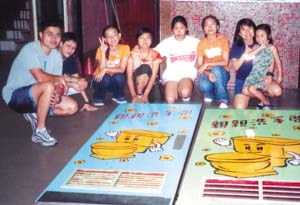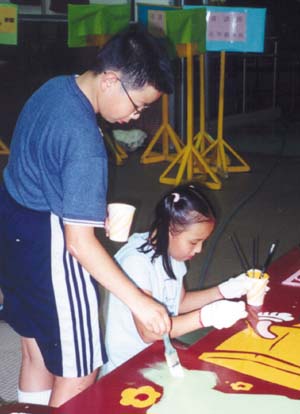




Learning through activities
Students develop washroom cultureBy Crystal Yip
Teachers and students of Sung Tak Wong Kin Sheung Memorial School (A.M.) won the most creative award in a competition organized by Hong Kong Commercial Broadcasting Co. for their activity, “Be Close to Washrooms”.
The competition aimed at encouraging students to enjoy learning, enhancing effective communication, and developing creativity and a sense of commitment by organizing meaningful extra-curricular activities.
Miss Ng Mee-chong is the teacher in-charge of “Be Close to Washrooms” in the school as well as the Health Promotion Committee coordinator at the school.
“We participated in the competition because the aims are very meaningful and appealing.”
Her school aims to promote “washroom culture” in the territory through this activity because many people, including adults, do not care about the hygiene of washrooms.
“Although our goals seem to be very big, we hope that we can achieve them,” she said.
Miss Ng said that she came up with the idea of “Be Close to Washrooms” from an exchange tour to Taiwan that she joined in April.
She visited primary schools in Taiwan that promote health education and emphasize the importance of a better school environment.
Said she: “I was very impressed. The schools there pay a lot of attention to the hygiene of washrooms.
“For instance, they put many plants in their washrooms and their washrooms are well ventilated.
“I realized then that students should develop good habits when using the toilets, such as flushing the toilets and washing hands, because these things directly affect students’ personal development.”
Miss Ng said that the school has put lots of effort into promoting health education because it thinks health education is as vital as academic studies.
“I think ‘Be Close to Washrooms’ is an activity that fits our school’s policy,” she said.
There are three parts to “Be Close to Washrooms”, namely a slogan design competition, a washroom door design competition and a campaign of health ambassadors.
Miss Ng said that almost everyone was involved in the the activities, including parents, teachers and students.
In the slogan competition, good slogans were chosen to spread the message of keeping washrooms clean. Students, teachers and parents then painted the slogans on the washroom doors.
Poon Wing-yin is a Primary 6 student at the school who took part in all these activities.
“I wrote a slogan and designed an interesting washroom door,” she said.
She was also a health ambassador, teaching students what to do when they use washrooms.
“I also told them to love our washrooms and keep them clean.”
The washroom door design competition was not only a competition for students, but also an activity for the whole school. Parents, teachers and students painted all washroom doors in the school, including 50 families.
Miss Ng said that the most challenging part of this activity is to remove all the washroom doors before painting.
Said she: “There was the risk that we could not put the doors back, as we are all inexperienced with that.”
A lack of time and resources posed other problems.
“We spent seven hours painting the first door, and we were afraid that we would be unable to finish painting all of them in time,” she said.
The students found it fun to paint the doors because they could do it according to their own designs.
Tsang Po-man, a Primary 2 student at the school, said, “I always choose to go to the toilet with the door painted by me. I also told my classmates not to damage it.”
Some students liked the painting process because their parents helped out.
“My parents helped me mix the paint and taught me how to use the brush properly,” Poon Wing-yin said.
The school then presented the whole activity to the panel of the competition in the form of a radio drama.
The students played different roles in the drama, such as the washroom floor, the toilets and the plants in the washrooms.Through this radio drama, they told people about the importance of keeping washrooms clean.
Poon Wing-yin said that going to the studio was a wonderful experience.
Said she: “We all found it interesting. We were not nervous at all.”
Miss Ng said that there was not much difficulty in organizing the activity, as the parents were very cooperative.
Students enjoyed the whole process and felt confident that they would win the competition.
“It was a very fantastic activity,” Poon Wing-yin said. “I predicted that we must be able to get the prize.”
Both teachers and students gained valuable experience from this activity.
Kwok Ying-yuet, a Primary 6 student at the school, said, “I learned how to cooperate with others and this activity helped strengthen my friendship with my classmates.”
Lai Siu-hei is another Primary 6 student at the school. He said that he now understands the importance of being careful.
“When I painted the door, I was so careless that I made all my clothes very dirty,” he said.
Poon Wing-yin said, “My relationship with my parents became closer because my parents helped me a lot while painting the doors.”
She said that she and her teachers also become friends.
Meanwhile, Miss Ng learned that one must be flexible when doing things.
“The ability of adaptation and problem-solving is really important.”
Her students also taught her a lot.
“I saw that the students were very enthusiastic in the activity,” she said.
“I’ve learned that we should put our heart and soul into our work, and probably, we will succeed.”
Miss Ng said that the activities fulfilled the aims of the competition.
“In terms of enjoying learning, I could clearly see that the students liked the activities very much,” she said.
“The ability of communication was enhanced tremendously because we had to discuss every part of the activity with the parents, teachers and students.
“Students were able to express their ideas through writing slogans and drawings.”
She also said that they used creativity.
“We used such a unique way to spread the message of ‘Be Close to Washrooms’, and to promote health education,” she said.
“And I think we did develop a sense of commitment because the activity was on such a large scale and we were prepared to bear all consequences.”